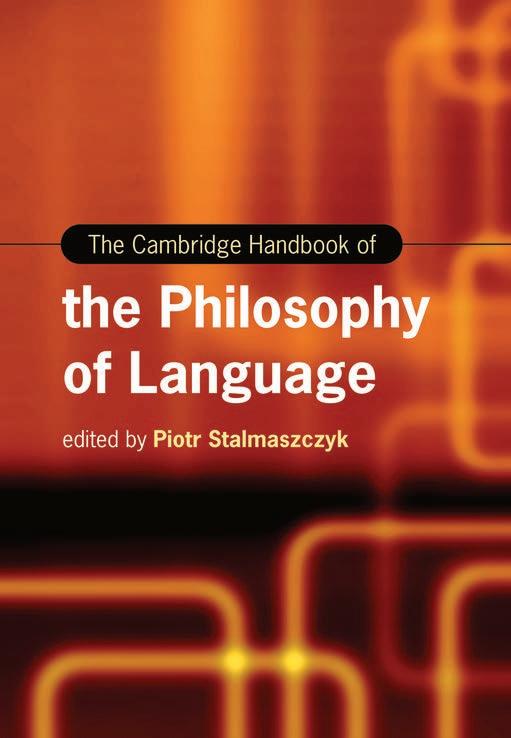
2 minute read
Reference and Theories of Reference
Piotr Stalmaszczyk
Advertisement
University of Lodz, Poland
Description
The philosophy of language is central to the concerns of those working across semantics, pragmatics and cognition, as well as the philosophy of mind and ideas. Bringing together an international team of leading scholars, this handbook provides a comprehensive guide to contemporary investigations into the relationship between language, philosophy, and linguistics. Chapters are grouped into thematic areas and cover a wide range of topics, from key philosophical notions, such as meaning, truth, reference, names and propositions, to characteristics of the most recent research in the field, including logicality of language, vagueness in natural language, value judgments, slurs, deception, proximization in discourse, argumentation theory and linguistic relativity. It also includes chapters that explore selected linguistic theories and their philosophical implications, providing a much-needed interdisciplinary perspective. Showcasing the cutting-edge in research in the field, this book is essential reading for philosophers interested in language and linguistics, and linguists interested in philosophical analyses.
Key Features
• Introduces the main issues in contemporary philosophy of language and linguistics • Offers an interdisciplinary perspective, and shows how research in different disciplines can interact • Provides examples of research in contemporary semantics and pragmatics as well as examples of how philosophical theories are applied to linguistic concepts.
Contents
1. Philosophy of Language: Definitions, Disciplines and Approaches; Part I. The Past, Present, and Future of Philosophy of Language: 2. The History of the Philosophy of Language Before Frege; 3. How the Philosophy of Language Grew out of Analytic Philosophy; 4. Philosophy of Language for the Twenty-First Century; Part II. Some Foundational Issues: 5. Philosophy of Language, Ontology and Logic; 6. Frege’s Legacy in the Philosophy of Language and Mind; 7. Metasemantics and Metapragmatics: Philosophical Foundations of Meaning; 8. Internalist Perspectives on Language; 9. Semantic Content and Utterance Context: A Spectrum of Approaches; 10. Semantic Minimalism and Contextualism in Light of the Logicality of Language; Part III. From Truth to Vagueness: 11. Truth and Theories of Truth; 12. Reference and Theories of Reference; 13. Names in Philosophy; 14. Indexicals and Contextual Involvement; 15. Natural Kind Terms; 16. Vagueness in Natural Language; Part IV. Issues in Semantics and Pragmatics: 17. Entailment, Presupposition, Implicature; 18. Speech Acts, Actions, and Events; 19. Propositions, Predication, and Assertion; 20. Events in Semantics; 21. Semantics and Generative Grammar; 22. Metasemantics: A Normative Perspective (and the Case of Mood); 23. The Normativity of Meaning and Content; 24. The Semantics and Pragmatics of Value Judgments; 25. Slurs: Semantic and Pragmatic Theories of Meaning; Part V. Philosophical Implications and Linguistic Theories: 26. Philosophical Implications of Generative Grammar; 27. Conceptual Semantics and its Implications for Philosophy of Language; 28. Relevance Theory and the Philosophy of Language; 29. Mental Files; 30. Contemporary Discourse Studies and Philosophy of Language; Part VI. Some Extensions: 31. The Philosophy of Argument; 32. Negation and Denial; 33. Deception: Lying and Beyond; 34. Types and Definitions of Irony; 35. Philosophy of Language and Metaphor; 36. Analytic Philosophy of Literature; 37. The Many Facets of Linguistic Relativity.
Additional Information
Level: Academic researchers, graduate students Series: Cambridge Handbooks in Language and Linguistics
July 2021 244 x 170 mm c.800pp 978-1-108-49238-6 Hardback £125.00 / US$165.00










